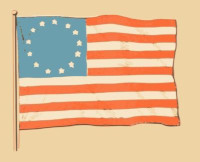
Many think our government follows the principles championed by Thomas Jefferson.
The phrase, “Jeffersonian democracy” is based on Thomas Jefferson’s defeat of the Federalist Party in 1800, and his tremendously democratic view of government. But I argue that, unfortunately, today we live in a society much more influenced by Jefferson’s arch-enemy, Alexander Hamilton. So we do not live in a Jeffersonian democracy.
Hamilton and Jefferson had totally opposite visions for America. Hamilton wanted an economy dominated by industry and a moneyed class, along with a strong central government and a federal bank. Jefferson wanted an economy dominated by gentlemen farmers like him, with no moneyed class, along with strong state governments and no federal bank. Which of these men’s visions holds sway today?
Colonel Hamilton was General George Washington’s aide-de-camp during America’s War for Independence. Hamilton’s brilliance so impressed Washington that, on becoming President, he appointed Hamilton as the first U.S. Secretary of the Treasury. Thereafter, Washington and his cabinet, with the exception of Secretary of State Jefferson, followed Hamilton’s opinions on every subject. Washington’s unwavering acceptance of Hamilton’s opinions eventually led Jefferson to resign from the cabinet in disgust.
Alexander Hamilton believed a well-funded capitalist class was necessary to industrialize America.
He thought industrialization was necessary to compete with the superior manufacturing base and privileged classes of Europe. He also believed that a single centralized government was needed to regulate international trade. Otherwise merchants would have to work with the wildly different trade policies of multiple state governments. That would be too inefficient to compete with the industries of Europe which were highly efficient thanks to their tight control by kings.
The reports of Hamilton in 1790 and 1791, taken together, constitute a theoretical plan which is just beginning to be appreciated. … A fully negotiable funded debt, drained originally from the small-property classes and met by taxes paid by the masses, was to be used by an emerging moneyed class to create profitable speculative enterprises in lands, industry, and finance…. [F]rom the point of view of the creation and strengthening of a moneyed interest, his whole plan was flawless both in conception and execution….Hamilton put his trust in the privileged classes and considered their interests as inseparable from those of society as a whole…. [A] more perfect device for the concentration of wealth at that time could hardly have been conceived. (Charles 1956, 30)
But:
Hamiltonianism, today, is out of place or even dangerous. It gives support and authority to those who wish to expand the scope of government in the economy and society at a time when there seems to be a clear need to bring the scope of government under control. …Hamilton would be stunned at the range of activities now within the sphere of the national government. (McNamara 1998, 150)
In fairness I should point out that Hamilton never tried to profit from his policies, though they made others fabulously rich. Hamilton himself died with very little wealth. Incidentally, it was President Jefferson’s vice president, Aaron Burr, who killed Hamilton in a duel.
I agree that Hamiltonianism should be “out of place”, but I argue that it is actually “in place”.
So do we live in a Jeffersonian democracy? I think it’s more accurate to say we live in a Hamiltonian oligarchy (rule by the rich). We all know our government listens to corporate owners and managers more than regular people due to their gigantic campaign contributions. And today we have the so-called Federal Reserve, which is actually owned by private banks, and is essentially what Hamilton called for in 1791 in the First Bank of the United States. Both of these realities are opposite to Thomas Jefferson’s vision for American democracy.
Who really controls America – the rich and powerful, or the people at large? So do we live in a “Jeffersonian democracy”? Or do we live in a “Hamiltonian oligarchy”?
Would you like to change that? If so, how would you go about it?
This site is for discussing how to improve our political system. It is NOT for discussing party politics or political figures. So if you have a non-partisan question or comment, feel free to leave it below.
Next Post
Sources:
Charles, Joseph. 1956. The Origins of the American Party System. Williamsburg, VA.: The Institute of Early American History and Culture.
McNamara, Peter. 1998. Political Economy and Statesmanship: Smith, Hamilton, and the Foundation of the Commercial Republic. Ithaca, NY: Cornell University Press, Northern Illinois University Press.


I have read your article carefully and I agree with you very much. This has provided a great help for my thesis writing, and I will seriously improve it. However, I don’t know much about a certain place. Can you help me?
I’ll help if I can. What is your question?
Can you be more specific about the content of your enticle? After reading it, I still have some doubts. Hope you can help me. https://accounts.binance.com/en/register?ref=P9L9FQKY
Your article helped me a lot, is there any more related content? Thanks! https://accounts.binance.com/fr/register-person?ref=V2H9AFPY
Can you be more specific about the content of your article? After reading it, I still have some doubts. Hope you can help me. https://accounts.binance.com/bn/register-person?ref=V3MG69RO
Your point of view caught my eye and was very interesting. Thanks. I have a question for you. https://accounts.binance.com/ph/register-person?ref=V3MG69RO
Wow, awesome weblog layout! How lengthy have you been blogging
for? you made blogging look easy. The overall glance of
your website is excellent, let alone the content!
You can see similar: dobry sklep and here najlepszy sklep